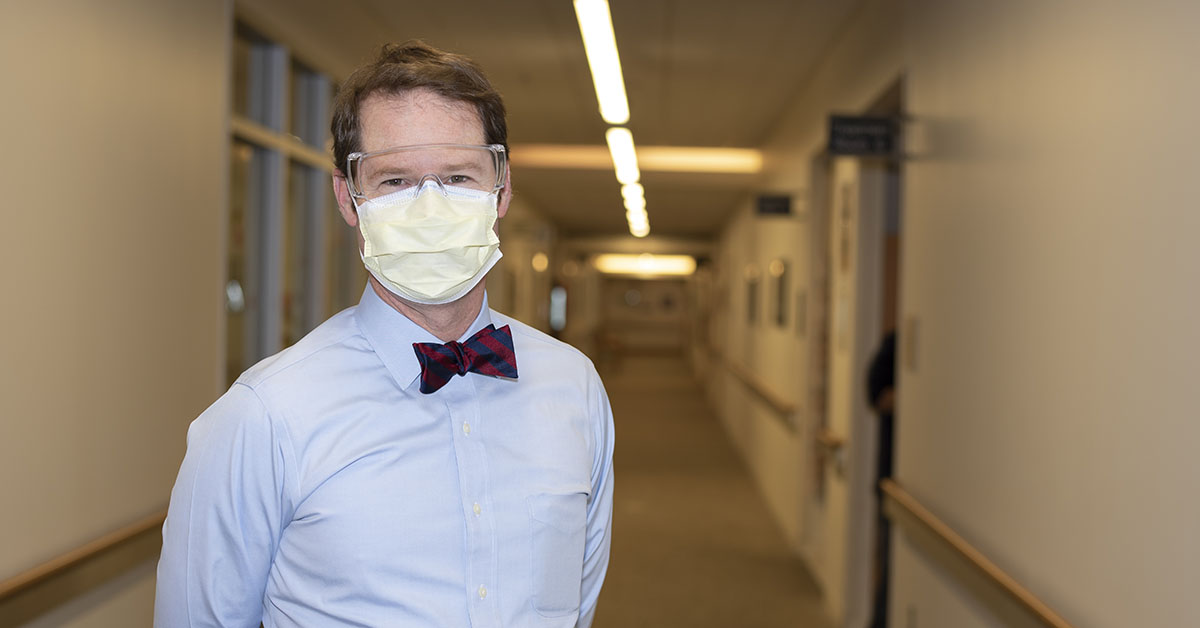Weather Alert: Following the winter storm, all Temple Health hospitals, campuses and clinical locations remain open. Patients will be contacted directly if their visit is affected. Please check TempleHealth.org or FoxChase.org for updates and monitor myTempleHealth for changes to scheduled appointments.
Breadcrumb
- Home
- Fox Chase Cancer Center News
- Fox Chase Researchers Find Association Between Rapid Recurrence and Poor Survival Outcomes in Head and Neck Cancer
Fox Chase Researchers Find Association Between Rapid Recurrence and Poor Survival Outcomes in Head and Neck Cancer

PHILADELPHIA (December 3, 2020)—Researchers at Fox Chase Cancer Center recently published new data showing that patients with head and neck cancer (HNC) recur just weeks after a complete operation at an under-appreciated rate and that this is associated with poor survival outcomes.
In addition, HNC patients with extranodal extension, who are at the highest risk of this rapid recurrence, may benefit from diagnostic imaging evaluations immediately prior to postoperative radiation therapy in order to accurately identify potential recurrences.
The findings are important because HNC patients with high-risk, pathologic features do not do well with the standard treatment protocol of an operation followed by radiation therapy, said Thomas J. Galloway, MD, an associate professor in the Department of Radiation Oncology at Fox Chase and senior author of the study, which he conducted with a team of colleagues at his center.
“A component of the reason they’re not doing well is that they may already be recurring by the time they’re beginning their course of radiation, so radiation oncologists in particular should be mindful of the possibility,” Galloway said.
“So, the purpose of this study was to quantify how often that happens and to evaluate when we notice it happening and we give more radiation if we improve the patients’ outcome,” he added.
The researchers reviewed the records of 194 patients who had primary HNC managed surgically with radiation therapy at the center and retrievable computed tomography (CT) simulations between 2010 and 2017.
They characterized the simulations with descriptive statistics, including the relationships between the presence or absence of rapid recurrence at any location, patient-related variables (e.g., age, gender, race), and tumor-related variables (e.g., tumor subsite, histological grade, clinical stage, tumor size, time between operation, and CT simulation).
The researchers retrospectively found that rapid recurrence occurred in 39 patients (20%), all of whom received radiation therapy with a dose of at least 60 Gy to the high-risk region. Twenty-three patients did not have the recurrence appreciated at the time of CT simulation and received 60 Gy, while the rest received an escalated dose of 66 to 70 Gy.
Then they used a variety of statistical tests to model the relationships between rapid recurrence at any location with factors that were significantly associated with rapid recurrence.
The findings showed that “despite adequate imaging and a treatment philosophy promoting reliable identification of rapid recurrence, more than half of the patients retrospectively diagnosed with rapid recurrence were not recognized to have recurred at the time of treatment planning and thus were treated with the usual adjuvant dosing (60 Gy),” the authors wrote.
“If radiation oncologists recognized patients’ recurrence and treated it as such, rather than a standard postoperative therapy, it could potentially improve outcomes for the patients,” Galloway said.
The article, “Rapid Recurrence in Head and Neck Cancer: Underappreciated Problem With Poor Outcome,” was published in Head & Neck.
Fox Chase Cancer Center (Fox Chase), which includes the Institute for Cancer Research and the American Oncologic Hospital and is a part of Temple Health, is one of the leading comprehensive cancer centers in the United States. Founded in 1904 in Philadelphia as one of the nation’s first cancer hospitals, Fox Chase was also among the first institutions to be designated a National Cancer Institute Comprehensive Cancer Center in 1974. Fox Chase is also one of just 10 members of the Alliance of Dedicated Cancer Centers. Fox Chase researchers have won the highest awards in their fields, including two Nobel Prizes. Fox Chase physicians are also routinely recognized in national rankings, and the Center’s nursing program has received the Magnet recognition for excellence six consecutive times. Today, Fox Chase conducts a broad array of nationally competitive basic, translational, and clinical research, with special programs in cancer prevention, detection, survivorship, and community outreach. It is the policy of Fox Chase Cancer Center that there shall be no exclusion from, or participation in, and no one denied the benefits of, the delivery of quality medical care on the basis of race, ethnicity, religion, sexual orientation, gender, gender identity/expression, disability, age, ancestry, color, national origin, physical ability, level of education, or source of payment.
For more information, call 888-369-2427